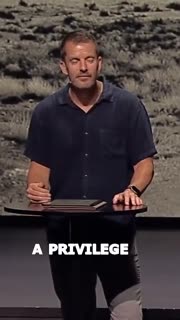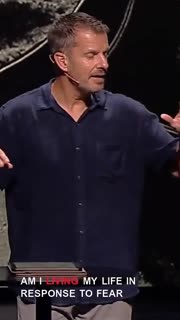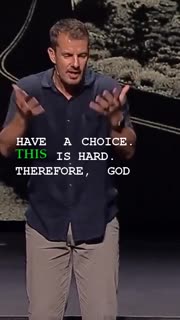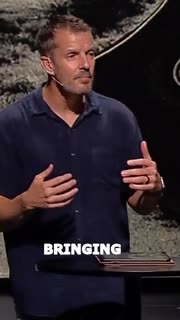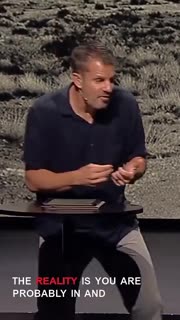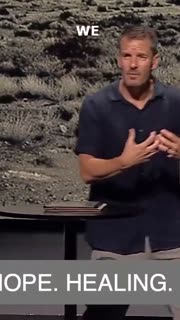Finding Purpose: Living by Faith, Not Fear
Devotional
Sermon Summary
Bible Study Guide
Sermon Clips
1. "What a privilege for in our lifetime, and I believe it, to see an uprising revival take place across the world, and in this nation, multiple other college ministries gathered on Thursday, and all of them were approximately double what they'd been in the past. There is something happening, and so let me also add one more thing that we got some feedback for, and there was multiple stories of people who came, and salvations in the house, and people who'd never been to church before, who thought they were coming just to a yunker, and people's gathering, and the, I'll say a little bit, they'd seen something on social media, and they thought, oh, it's a gathering of college kids, and you know, this is from ASU, a gathering of college kids, and even said, and the girls look attractive, why don't I go? Hey, by all means, win some. And so they like, but not realizing they were even coming to a church, and not realizing that what they heard that night was the gospel, and what happened by the end of that night is that person had given their whole life to Jesus. Like this, we're talking the kingdom of heaven advances one life at a time." [05:35] (79 seconds)
2. "Am I living my life in response to fear or am I living my life by faith? It's as clear as that. Divine order will come about if you walk by faith. That's trust in God. While we've been singing it this morning, I love that song. That trusting God angle. I don't need to know what's gonna happen. I trust him. Or it's a reaction to what is going on around me and my decision making is driven by fear. I'm telling you, you live your life with fear, that's gonna lead you to hevel. You live it by faith, divine order, divine purpose. We get to see meaning behind, things that seem meaningless." [10:14] (47 seconds)
3. "If we only ever wanna change our lives from the outside in, Hevel, all transformation and long lasting legacy are an inside out deal. You see, we invite Jesus in and from the inside things flow out. The Holy Spirit dwelling in us, then what comes out of us. But if we wanna be just formed by what is external, oh, I just need more. This, therefore, it's Hevel. It will prove to be meaningless. But if I can get it to a posture where everything that I have has purpose and has meaning and is in divine order, you will see that the legacy is beyond what you could possibly imagine. Possibly imagine." [24:28] (49 seconds)
4. "I have a finite knowledge and God has infinite wisdom. Can I have a bit of that, please, God? He has infinite wisdom and I have finite knowledge. To put it simply this way, He is all. All-powerful, all-knowing, omniscient. I have a three-pound brain. Now, you can sit with that and feel powerless or you can sit with that, I mentioned it the other week, because I am finite and He is infinite, that means what I can contain here is rich and beautiful and what I cannot, which is way more, spills over. And that goes into the realm of mystery. Church, we need to embrace the reality of the power of the mystery of God. He is God, I am not. I can't get my head around that, so I will worship Him. I don't understand why, so I will worship Him. I don't really, I'm so uncertain about the future, so I will worship Him. This mystery, this mystery of God, the spillage that comes over outside of our brain because he is more than is incredible." [25:59] (83 seconds)
5. "Can we live our lives in such a way that it draws people into the mystery and the wonder and the awe of God while still giving them the clarity of what we do know? Ecclesiastes is revealing this and in the end of the chapter, he's poking that out. There's no debate in my mind that God is infinite and I am finite. There's no debate in my mind in that my understanding, my understanding is limited and his is unlimited. There's no debate in my mind that I have to understand everything or it's not true. No, that's not the case. There's no debate in my mind that his ways are not my ways, his thoughts are not my thoughts. There's no debate. I've settled that in my mind." [28:02] (42 seconds)
6. "You have a choice. This is hard. Therefore, God doesn't care. Or this is hard. God is there and will care. He will meet you there. We can enter into people's lives in their pain and struggle and come alongside them and be the voice of hope. Or even in your own world, what are we doing with that? And Ecclesiastes is reviewing this all the time. This is on screen for you. Fill in this blank on this statement. If I had blank, then I would have said, then I would be like. Have a think about that for some of you. Some of you are thinking, if I had a better husband, I would be wonderful. If I had more money, I would be at peace. If I had a better boss, I would be less grumpy. If I, I'm playing, but I'm just filling in the air for you to think about it. Well, what is it? Cause you've all got something. If you're honest, you've all got a something. You've all got, you're a craving of something under the sun in this life. You've got a something. Why, what's it gonna bring you?" [22:46] (88 seconds)
7. "I have no problem in bringing testimony to that. Because we stand in awe of God and what He is doing. So if you are a college kid here today, thanks for letting me talk about you. You are the revival generation. Don't screw it up. You are the revival generation. I — we've been praying for that. I dreamed ten years ago when we were looking to come here, it was just like, oh, we're just Okay, this is what is possible. This is what is possible. It took longer than we thought, but only God, only God." [06:21] (43 seconds)
8. "The reality is you are probably in and around people when there is struggle and when there is pain, you have a choice. This is hard. Therefore, God doesn't care. Or this is hard. God is there and will care. He will meet you there. We can enter into people's lives in their pain and struggle and come alongside them and be the voice of hope. Or even in your own world, what are we doing with that? And Ecclesiastes is reviewing this all the time." [22:46] (34 seconds)
9. "You see, when we look at the definition of salvation, salvation literally means this, to be, well, the fourth one for Christians is forgiveness, forgiveness. They added it in. Why would those in the church, crave forgiveness more than those outside the church? Because forgiveness comes from a core condition called the conviction of sin. And in his presence and the Holy Spirit, there's a conviction of sin, not because he wants to make you feel bad, but because he wants to clean you. He wants to restore you. There's a conviction of sin in you, and the craving for forgiveness is cleanse me. beautiful. And so salvation by its definition means to be forgiven, redeemed, brought back, restored, back into oneness with God, justified, just as if I had never sinned and have eternity secure. That's salvation. It's not just, oh, Jesus died for me. What for? So I could be forgiven, redeemed, restored into all eternity, justified, and throughout, all eternity. There is a wholeness, a return to God's original intention that unfolds in salvation. And Ecclesiastes is revealing this, and this study is showing it." [19:07] (83 seconds)
10. "I have a finite knowledge and God has infinite wisdom. Can I have a bit of that, please, God? He has infinite wisdom and I have finite knowledge. To put it simply this way, He is all. All-powerful, all-knowing, omniscient. I have a three-pound brain. Now, you can sit with that and feel powerless or you can sit with that, I mentioned it the other week, because I am finite and He is infinite, that means what I can contain here is rich and beautiful and what I cannot, which is way more, spills over. And that goes into the realm of mystery. Church, we need to embrace the reality of the power of the mystery of God. He is God, I am not. I can't get my head around that, so I will worship Him. I don't understand why, so I will worship Him. I don't really, I'm so uncertain about the future, so I will worship Him. This mystery, this mystery of God, the spillage that comes over outside of our brain because he is more than is incredible." [25:59] (83 seconds)
Ask a question about this sermon
2. "Am I living my life in response to fear or am I living my life by faith? It's as clear as that. Divine order will come about if you walk by faith. That's trust in God. While we've been singing it this morning, I love that song. That trusting God angle. I don't need to know what's gonna happen. I trust him. Or it's a reaction to what is going on around me and my decision making is driven by fear. I'm telling you, you live your life with fear, that's gonna lead you to hevel. You live it by faith, divine order, divine purpose. We get to see meaning behind, things that seem meaningless." [10:14] (47 seconds)
3. "If we only ever wanna change our lives from the outside in, Hevel, all transformation and long lasting legacy are an inside out deal. You see, we invite Jesus in and from the inside things flow out. The Holy Spirit dwelling in us, then what comes out of us. But if we wanna be just formed by what is external, oh, I just need more. This, therefore, it's Hevel. It will prove to be meaningless. But if I can get it to a posture where everything that I have has purpose and has meaning and is in divine order, you will see that the legacy is beyond what you could possibly imagine. Possibly imagine." [24:28] (49 seconds)
4. "I have a finite knowledge and God has infinite wisdom. Can I have a bit of that, please, God? He has infinite wisdom and I have finite knowledge. To put it simply this way, He is all. All-powerful, all-knowing, omniscient. I have a three-pound brain. Now, you can sit with that and feel powerless or you can sit with that, I mentioned it the other week, because I am finite and He is infinite, that means what I can contain here is rich and beautiful and what I cannot, which is way more, spills over. And that goes into the realm of mystery. Church, we need to embrace the reality of the power of the mystery of God. He is God, I am not. I can't get my head around that, so I will worship Him. I don't understand why, so I will worship Him. I don't really, I'm so uncertain about the future, so I will worship Him. This mystery, this mystery of God, the spillage that comes over outside of our brain because he is more than is incredible." [25:59] (83 seconds)
5. "Can we live our lives in such a way that it draws people into the mystery and the wonder and the awe of God while still giving them the clarity of what we do know? Ecclesiastes is revealing this and in the end of the chapter, he's poking that out. There's no debate in my mind that God is infinite and I am finite. There's no debate in my mind in that my understanding, my understanding is limited and his is unlimited. There's no debate in my mind that I have to understand everything or it's not true. No, that's not the case. There's no debate in my mind that his ways are not my ways, his thoughts are not my thoughts. There's no debate. I've settled that in my mind." [28:02] (42 seconds)
6. "You have a choice. This is hard. Therefore, God doesn't care. Or this is hard. God is there and will care. He will meet you there. We can enter into people's lives in their pain and struggle and come alongside them and be the voice of hope. Or even in your own world, what are we doing with that? And Ecclesiastes is reviewing this all the time. This is on screen for you. Fill in this blank on this statement. If I had blank, then I would have said, then I would be like. Have a think about that for some of you. Some of you are thinking, if I had a better husband, I would be wonderful. If I had more money, I would be at peace. If I had a better boss, I would be less grumpy. If I, I'm playing, but I'm just filling in the air for you to think about it. Well, what is it? Cause you've all got something. If you're honest, you've all got a something. You've all got, you're a craving of something under the sun in this life. You've got a something. Why, what's it gonna bring you?" [22:46] (88 seconds)
7. "I have no problem in bringing testimony to that. Because we stand in awe of God and what He is doing. So if you are a college kid here today, thanks for letting me talk about you. You are the revival generation. Don't screw it up. You are the revival generation. I — we've been praying for that. I dreamed ten years ago when we were looking to come here, it was just like, oh, we're just Okay, this is what is possible. This is what is possible. It took longer than we thought, but only God, only God." [06:21] (43 seconds)
8. "The reality is you are probably in and around people when there is struggle and when there is pain, you have a choice. This is hard. Therefore, God doesn't care. Or this is hard. God is there and will care. He will meet you there. We can enter into people's lives in their pain and struggle and come alongside them and be the voice of hope. Or even in your own world, what are we doing with that? And Ecclesiastes is reviewing this all the time." [22:46] (34 seconds)
9. "You see, when we look at the definition of salvation, salvation literally means this, to be, well, the fourth one for Christians is forgiveness, forgiveness. They added it in. Why would those in the church, crave forgiveness more than those outside the church? Because forgiveness comes from a core condition called the conviction of sin. And in his presence and the Holy Spirit, there's a conviction of sin, not because he wants to make you feel bad, but because he wants to clean you. He wants to restore you. There's a conviction of sin in you, and the craving for forgiveness is cleanse me. beautiful. And so salvation by its definition means to be forgiven, redeemed, brought back, restored, back into oneness with God, justified, just as if I had never sinned and have eternity secure. That's salvation. It's not just, oh, Jesus died for me. What for? So I could be forgiven, redeemed, restored into all eternity, justified, and throughout, all eternity. There is a wholeness, a return to God's original intention that unfolds in salvation. And Ecclesiastes is revealing this, and this study is showing it." [19:07] (83 seconds)
10. "I have a finite knowledge and God has infinite wisdom. Can I have a bit of that, please, God? He has infinite wisdom and I have finite knowledge. To put it simply this way, He is all. All-powerful, all-knowing, omniscient. I have a three-pound brain. Now, you can sit with that and feel powerless or you can sit with that, I mentioned it the other week, because I am finite and He is infinite, that means what I can contain here is rich and beautiful and what I cannot, which is way more, spills over. And that goes into the realm of mystery. Church, we need to embrace the reality of the power of the mystery of God. He is God, I am not. I can't get my head around that, so I will worship Him. I don't understand why, so I will worship Him. I don't really, I'm so uncertain about the future, so I will worship Him. This mystery, this mystery of God, the spillage that comes over outside of our brain because he is more than is incredible." [25:59] (83 seconds)
